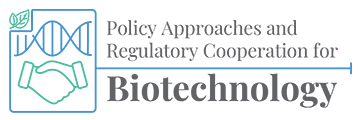Organization for Economic Cooperation and Development’s Working Parties on Biotechnology
Cooperators:
OECD Members
Geography/Region:
Global
Mechanism of Cooperation:
Information Sharing
Category of Cooperation:
Forum
Last Updated:
August 8, 2024
Opportunity for APEC Economies
APEC economies like the rest of the world continue to refer to the consensus documents developed by the OECD Working Parties that work on biotechnology to inform and develop their domestic regulatory frameworks and evaluate dossiers. The guidance provided by the documents has been instrumental in facilitating harmonization between agencies regulating products of agricultural biotechnology worldwide including in APEC economies.
Description
There are two Working Parties within the OECD that implement work related to biotechnology. The goal is to increase the efficiency of the risk/safety assessment process, reduce duplication of effort, and promote harmonized approaches to reduce costs and the potential for non-tariff barriers to trade. The Working Party on the Harmonisation of Regulatory Oversight in Biotechnology addresses aspects of the environmental risk/safety assessment of genetically engineered organisms. The Working Party for the Safety of Novel Foods and Feeds addresses the safety assessment of foods and feeds derived from genetically engineered organisms.
The main outputs of the two Working Parties are the OECD Consensus Documents which constitute practical tools for safety assessors, regulators, applicants for commercial uses of transgenic organisms, and the wider scientific community. These documents compile key science-based information on major crops, trees, animals, and micro-organisms, as well as on introduced traits, which risk/safety assessors believe to be relevant when comparing new genetically engineered products with conventional ones. The documents relating to environmental safety focus mainly on the biology of plants (species and taxonomic group, reproductive biology, potential for out-crossing with related species, centers of diversity, agronomic practices, major uses, and other relevant elements). Two biology documents on animals have also been prepared. The documents for food and feed safety contain information on composition, including the key nutrients, toxicants, anti-nutrients, allergens, and other metabolites where relevant. These publications on crop composition provide solid information and are used by authorities worldwide as key references in the comparative approach conducted as part of their novel food and feed safety assessments.
One of the OECD consensus documents that is especially relevant to regulatory cooperation in agricultural biotechnology is titled ‘Considerations for Collaborative Work on the Safety Assessment of Foods and Feeds Derived from rDNA Plants’. This document was drafted with a purpose to serve as a resource for regulatory agencies willing to collaborate on the safety assessment of foods and feeds derived from rDNA plants. Several types of collaborative work have been described in this document, and it also highlights the potential benefits and challenges of implementing collaborations. Furthermore, this document describes the underlying principles governing such collaborative work and highlights the key efforts that may be foundational to beginning such work. This document provides real-world examples of collaborative work between agencies.
In addition to the Consensus Documents, Both OECD Working Parties publish a compilation of the latest developments in delegation meetings. Termed as the ‘Tour de Table’ documents published by the Working Parties, these summarize relevant information on activities related to biosafety issues and safety assessment of novel foods and feeds at the international level. The documents collate individual contributions from OECD Members, Key Partners, and observer organizations participating in the work. The latest Tour de Table documents summarizing the developments from May 2023 – February 2024 are accessible at: Biosafety Issues – Developments in Delegations on Biosafety Issues, May 2023 – February 2024 Safety Assessment of Novel Foods and Feeds – Developments in Delegations on the Safety Assessment of Novel Foods and Feeds, May 2023 – February 2024.Another OECD resource that facilitates information sharing is the BioTrack Product Database. This is a public database of genetically engineered products that is updated voluntarily by officials of OECD member and non-member economies. The database aims to allow regulatory officials to easily share basic information on products of modern biotechnology that have been approved for commercial application in terms of food, feed, or environmental safety. The biotech products are tagged with their “Unique Identifiers” (coding system developed by OECD), thus facilitating the exchange of information between international databases.
The OECD also releases the Internal Co-ordination Group for Biotechnology (ICGB) Biotechnology Update Newsletter, twice a year, to provide up-to-date information on activities related to biotechnology or the life sciences more generally.
Relevant links
- OECD Consensus Documents – https://www.oecd.org/en/topics/biosafety-novel-food-and-feed-safety.html.
- OECD Consensus Document on Considerations for Collaborative Work on Safety Assessment of Foods and Feeds Derived from rDNA plants: https://one.oecd.org/document/ENV/CBC/MONO(2023)37/en/pdf.
- Developments in Delegations on Biosafety Issues, May 2023 – February 2024.
- Developments in Delegations on the Safety Assessment of Novel Foods and Feeds, May 2023 – February 2024.
- OECD BioTrack Product Database.
